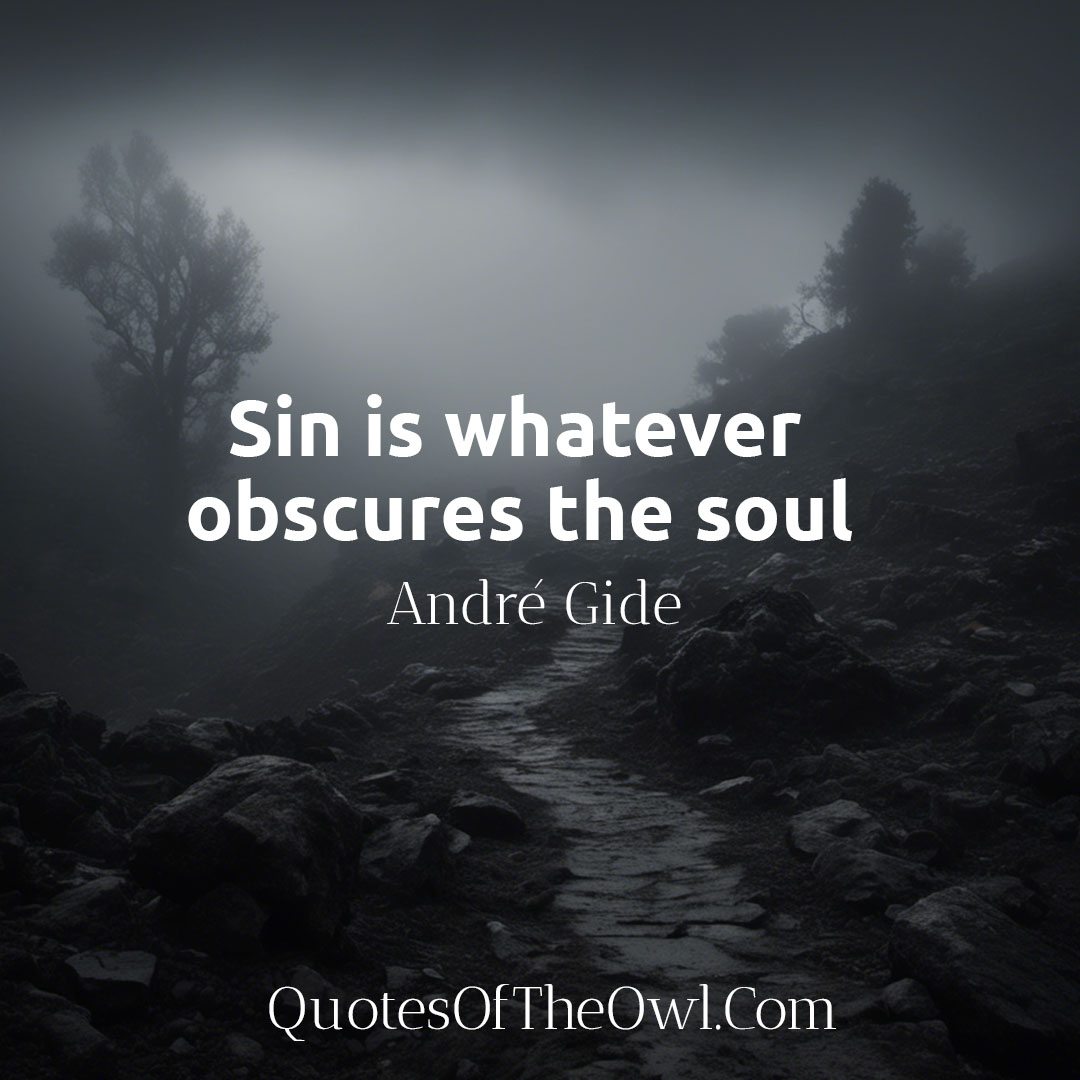Discover the Profound Meaning Behind André Gide’s Quote: “Sin is Whatever Obscures the Soul”
“Sin is whatever obscures the soul.” This profound quote by André Gide encapsulates a deep philosophical inquiry into the nature of sin and its impact on the human spirit. But what does Gide mean by this, and why is it significant? To fully appreciate the depth of this statement, we need to delve into the life and beliefs of André Gide and explore the various interpretations of his words.
Understanding the Context
André Gide was a French author and Nobel Prize winner in Literature, renowned for his exploration of human freedom and the complexities of morality. Writing in the late 19th and early 20th centuries, Gide’s works often challenged societal norms and delved into the inner workings of the human psyche. His quote on sin reflects his broader philosophical inquiries.
Breaking Down the Quote
Definition of “Sin”
Traditionally, sin is seen as a transgression against divine law. However, Gide’s use of the term is more nuanced. He suggests that sin is not merely a violation of religious codes but anything that clouds or distorts the purity of the soul.
Obscuring the Soul
To obscure the soul means to hinder its clarity and truth. It involves actions, thoughts, and behaviors that lead to confusion, moral ambiguity, or a loss of self-awareness and authenticity.
Gide’s Perspective on Sin
Gide’s personal beliefs were heavily influenced by his upbringing in a Protestant family and his subsequent rejection of conventional religious doctrines. He believed in the importance of personal freedom and authenticity, viewing any form of hypocrisy or self-deception as sinful because it obscured the soul’s true nature.
Philosophical Interpretations
Existentialist Interpretations
Existentialists might interpret Gide’s quote as a call to live authentically. Existentialist philosophy emphasizes the importance of personal choice and the creation of one’s own values. Sin, in this context, would be anything that prevents one from living in accordance with their true self.
Religious Interpretations
From a religious standpoint, Gide’s quote can be seen as a departure from traditional views of sin. Instead of focusing on adherence to external commandments, it shifts the focus to the internal state of the soul. Actions that lead to spiritual blindness or moral corruption are the true sins.
Psychological Interpretations
Psychologically, this quote resonates with the idea of cognitive dissonance, where individuals experience discomfort from holding contradictory beliefs or behaving in ways that contradict their values. Such dissonance obscures one’s understanding of self and is thus considered sinful.
Literary Analysis
Gide’s works frequently explore themes of inner conflict, self-deception, and the search for truth. His quote about sin aligns with these themes, emphasizing the importance of self-awareness and the dangers of living a lie. In novels like “The Immoralist” and “Strait Is the Gate,” Gide examines characters who struggle with these very issues.
Comparative Analysis
Comparison with Other Philosophical Views
Gide’s view of sin as an internal, soul-obscuring act can be compared to the ideas of other philosophers like Søren Kierkegaard, who spoke of despair as a state that alienates one from their true self, or Friedrich Nietzsche, who condemned self-deception and the herd mentality.
Similar Quotes from Other Authors
Consider Fyodor Dostoevsky’s assertion that “to go wrong in one’s own way is better than to go right in someone else’s.” Both quotes emphasize the importance of personal integrity and the dangers of compromising one’s soul.
Modern Relevance
Gide’s insight into sin remains relevant today. In a world filled with distractions and superficial values, it’s easy to lose sight of what truly matters. Modern “sins” that obscure the soul might include materialism, addiction to technology, or living a life dictated by societal expectations rather than personal convictions.
Obscuring the Soul: Practical Examples
Common actions that obscure the soul might include lying, engaging in harmful relationships, or pursuing goals that don’t align with one’s values. Avoiding these pitfalls involves introspection and a commitment to living truthfully.
Redemption and Clarity
Unobscuring the soul is a journey of redemption and self-discovery. This might involve seeking forgiveness, making amends, or simply realigning one’s life with their true values. The process is deeply personal and transformative.
Conclusion
André Gide’s quote, “Sin is whatever obscures the soul,” challenges us to look beyond traditional notions of sin and consider how our actions impact our inner clarity and truth. By understanding and embracing this perspective, we can strive for a life of greater authenticity and spiritual integrity.

